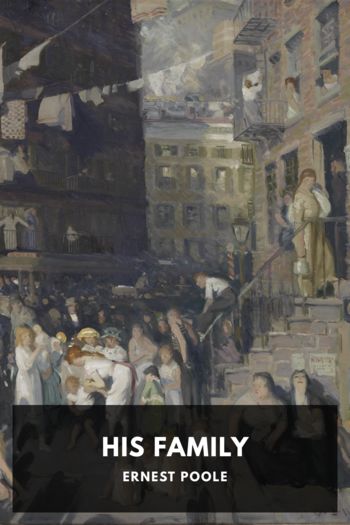His Family - Ernest Poole (ereader for comics .txt) 📗

- Author: Ernest Poole
Book online «His Family - Ernest Poole (ereader for comics .txt) 📗». Author Ernest Poole
“You will live on in our children’s lives.” The vision hidden in those words now opened wide before his eyes.
XIShe told him the next morning her night school closed for the summer that week.
“I think I should like to see it,” her father said determinedly. She gave him an affectionate smile:
“Oh, dearie. Haven’t you had enough?”
“I guess I can stand it if you can,” was his gruff rejoinder, “though if I ran a school like yours I think by night I’d have schooled enough. Do most principals run night schools too?”
“A good many of them do.”
“Isn’t it taxing your strength?” he asked.
“Don’t you have to tax your strength,” his daughter replied good humoredly, “to really accomplish anything? Don’t you have to risk yourself in order to really live these days? Suppose you come down tomorrow night. We won’t go to the school, for I doubt if the clubs and classes would interest you very much. I’ll take you through the neighborhood.”
They went down the following evening. The night was warm and humid, and through the narrow tenement streets there poured a teeming mass of life. People by the thousands passed, bareheaded, men in shirt sleeves, their faces glistening with sweat. Animal odors filled the air. The torches on the pushcarts threw flaring lights and shadows, the peddlers shouted hoarsely, the tradesmen in the booths and stalls joined in with cries, shrill peals of mirth. The mass swept onward, talking, talking, and its voice was a guttural roar. Small boys and girls with piercing yells kept darting under elbows, old women dozed on doorsteps, babies screamed on every side. Mothers leaned out of windows, and by their faces you could see that they were screaming angrily for children to come up to bed. But you could not hear their cries. Here around a hurdy gurdy gravely danced some little girls. A tense young Jew, dark faced and thin, was shouting from a wagon that all men and women must be free and own the factories and mills. A mob of small boys, clustered ’round a “camp fire” they had made on the street, were leaping wildly through the flames. It was a mammoth cauldron here, seething, bubbling over with a million foreign lives. Deborah’s big family.
She turned into a doorway, went down a long dark passage and came into a courtyard enclosed by greasy tenement walls that reared to a spot of dark blue sky where a few quiet stars were twinkling down. With a feeling of repugnance Roger followed his daughter into a tall rear building and up a rickety flight of stairs. On the fourth landing she knocked at a door, and presently it was opened by a stout young Irish woman with flushed haggard features and disheveled hair.
“Oh. Good evening, Mrs. Berry.”
“Good evening. Come in,” was the curt reply. They entered a small stifling room where were a stove, two kitchen chairs and three frowzled beds in corners. On one of the beds lay a baby asleep, on another two small restless boys sat up and watched the visitors. A sick man lay upon the third. And a cripple boy, a boarder here, stood on his crutches watching them. Roger was struck at once by his face. Over the broad cheek bones the sallow skin was tightly drawn, but there was a determined set to the jaws that matched the boy’s shrewd grayish eyes, and his face lit up in a wonderful smile.
“Hello, Miss Deborah,” he said. His voice had a cheery quality.
“Hello, Johnny. How are you?”
“Fine, thank you.”
“That’s good. I’ve brought my father with me.”
“Howdado, sir, glad to meet you.”
“It’s some time since you’ve been to see me, John,” Deborah continued.
“I know it is,” he answered. And then with a quick jerk of his head, “He’s been pretty bad,” he said. Roger looked at the man on the bed. With his thin waxen features drawn, the man was gasping for each breath.
“What’s the matter?” Roger whispered.
“Lungs,” said the young woman harshly. “You needn’t bother to speak so low. He can’t hear you anyhow. He’s dying. He’s been dying weeks.”
“Why didn’t you let me know of this?” Deborah asked gently.
“Because I knew what you’d want to do—take him off to a hospital! And I ain’t going to have it! I promised him he could die at home!”
“I’m sorry,” Deborah answered. There was a moment’s silence, and the baby whimpered in its sleep. One child had gone to his father’s bed and was frowning at his agony as though it were a tiresome sight.
“Are any of them coughing?” Deborah inquired.
“No,” said the woman sharply.
“Yes, they are, two of ’em,” John cheerfully corrected her.
“You shut up!” she said to him, and she turned back to Deborah. “It’s my home, I guess, and my family, too. So what do you think that you can do?” Deborah looked at her steadily.
“Yes, it’s your family,” she agreed. “And it’s none of my business, I know—except that John is one of my boys—and if things





Comments (0)